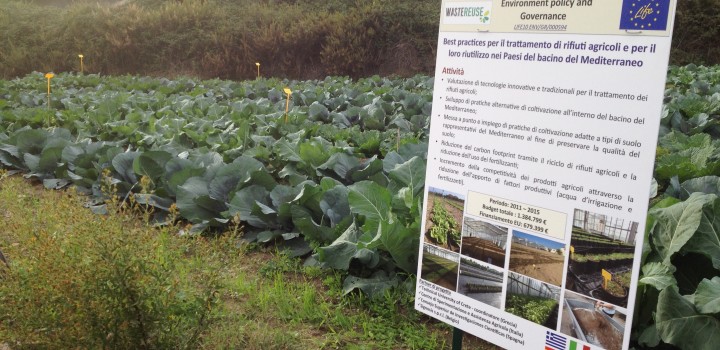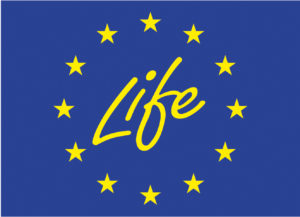BEST PRACTICES FOR AGRICULTURAL WASTES TREATMENT AND REUSE IN THE MEDITERRANEAN COUNTRIES
Products
Newsletter
Partner
• Technical University of Crete (TUC), Greece
• Centro de Edafologia y Biologia Aplicada del Segura , Consejo Superior de Investigaciones Cientificas (CEBAS-CSIC), Spain
• Centro Regionale di Sperimentazione e Assistenza Agricola (CeRSAA), Italy
• Laboratorio chimico della Camera di Commercio di Savona (Laboratorio chimico CCIAA), Italy
• SIGNOSIS SPRL. (SIGNOSIS), Belgium
Funding body
Directorate General Environment – European Commission.
Objectives
– Evaluation of innovative as well as, traditional technologies for agricultural wastes (AW) treatment regarding their suitability for crop cultivation (irrigation and fertilization);
– Development of Alternative Cultivation Practices for the most widely cultivated and water demanded crops (e.g. vegetables, cereals) in Mediterranean by recycling nutrients and water from AW via identification and development of Best Management Practices for waste application to main market crops aiming at maximizing yields and minimizing offsite environmental impacts;
– Protection of soil quality from the disposal of processed and un-processed AW by developing and using innovative cultivation practices which will be suitable for Mediterranean soil types;
– Reduction of carbon footprint by recycling AW and minimizing the use of fertilizers. Conservation of natural resources (e.g. soil, water, phosphate deposits) from excessive use and uncontrolled wastes disposal;
– Increasing competiveness of Mediterranean agricultural products and profits via the reduction of external inputs (irrigation water and fertilizers).
Materials and methods
The Technical University of Crete (TUC) is charged with project coordination.
The project is arranged into 12 actions organized as follows:
• Action 1, 11, 12: coordination of the project partner, monitoring of the activities and planning of the dissemination, also after the end of the project.
• Action 2: research and initial assessment of the existing AW treatment technologies.
• Action 3 (CEBAS) and 4 (Laboratorio chimico CCIAA): lab experiments in order to evaluate
solid wastes and wastewaters’ properties; development of new specific agricultural practices for the most common cultivated crops.
• Action 5 (CEBAS) and 6 (CeRSAA): demonstration, through the set up of pilot areas, of the feasibility of the application of treated wastes in open field and in greenhouses cultivations.
• Action 7: Life Cycle Assessment (LCA) in terms of raw materials consumption, energy use and emissions as well as a Risk Analysis regarding phytotoxicity and potential quantified soil and water impacts of the options considered in Actions 3-4 as well as in 5-6.
• Action 8: development of a Code of Waste Management Practices for Agricultural Application.
• Action 9 and 10: dissemination of the results of the project and formulation of networks between scientific/research community, industry/market community and policy makers’ community.
Specific activities for CeRSAA: set up of experimental trials for the application to the crops of wastewater for irrigation and fertilization, and also the use of composts for soil quality improvement. Trials will be carried out for two years on open field cultivations of lettuce and cabbage and protected cultivations in greenhouse of basil and ornamentals. All the AW application techniques will be compared to the traditional irrigation and fertilization techniques. Cultivations will be monitored periodically regarding yield, plant health and growing level, qualitative and quantitative characteristics, production costs, water and nutrients consumption, soil quality for both open filed cultivations and substrates quality for greenhouses practices. During cultivation periods, visits of farmers and stakeholders (e.g. input suppliers, waste management companies, central and local government, and Government agencies) will be organized at demonstration areas.
Specific activities for Laboratorio chimico CCIAA: carried out of Lab experiments in order to assess the effects of wastes applied on soil for agricultural purposes. Different soil types and application ratios will be considered. Chemical composition of treated and untreated wastes, effects on soil properties and plant growth, germination factors, and input needs of cultivations will be considered to develop new practices. The obtained results will be useful for the development of alternative agricultural practices for key cultivated crops in Italy. Of great significant will be the results regarding the capability of different soil types to retain or to lose nutrients added through irrigation/fertilization with wastes
Expected results
• An inventory of all available technologies for AW treatment, grouped by level of development (lab, pilot, full scale).
• An inventory of the agricultural practices for the use of treated AW as derived from the already developed technologies for the most common cultivated and water demanded crops in the Mediterranean.
• Characterization by lab analyses of wastes treated by different technologies, regarding their suitability for agricultural use and especially for vegetable, cereals and ornamentals cultivation under open field and greenhouse conditions.
• Development of new/alternative cultivation methods with the use of treated or untreated AW;
• A report regarding soil quality protection by the sustainable use of treated agricultural wastes in crop cultivation.
• Recycling nutrients and water through the reuse of treated AW. Evaluation of environmental benefits.
• Development of a Code of Waste Management Practices for Agricultural Application.
• A set of actions, measures and means that should be taken by Mediterranean national policy makers to conform to European legislation requirements.
• Legislative recommendations for AW reuse policy.
• Development and proposal of a legislative framework for the use of treated wastes in terms of water and nutrient management, across the various soil climatic conditions prevailing in Mediterranean.
• LCA (Life Cycle Assessment) studies for the main crops considered using the most feasible AW treatment options.
• Improve knowledge about wastes management impacts on soil nutrient availability as well as the excess deposition of inorganic and organic constituents.
• Creation of a webpage including links to other similar EC funded projects for the maximum dissemination of project results.
• Participation of stakeholders (producers, local authorities, etc) from Med countries in the assessment of applicability of developed wastes management practices in crop production.
• Continuous wide dissemination through the network that will be established with the scientific/research; industry/market; and policy makers communities.
• Improvement of the quality of life in the areas affected by uncontrolled wastes disposal.
• Energy benefits in terms of CO2 (and other greenhouse gases, e.g. methane) footprint reduction.


